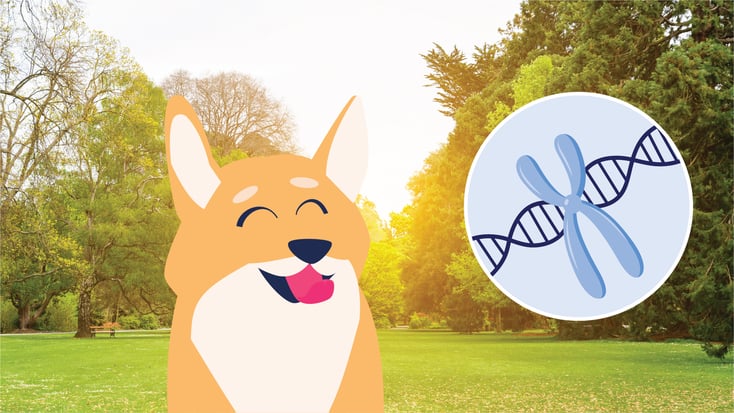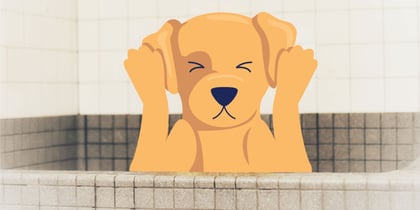Can Dogs Have Down Syndrome?

Table of Contents
If you are worried that you might have a dog with Down Syndrome or just want to know more about whether the condition exists in dogs, look no further. This article aims to answer all your questions about Down Syndrome in dogs, from whether it genuinely exists to how you can support your dog if they show some characteristics.
Key Takeaways:
- Dogs have a different chromosome count than humans, so Down Syndrome does not occur in them.
- Dogs may display traits or characteristics similar to some humans, such as stunted or slow growth, a flatter face, a protruding tongue, reduced cognitive function, or delayed cognitive development.
- If you suspect your dog is exhibiting signs resembling Down Syndrome, consult with a veterinarian for proper evaluation and guidance.
What is Down Syndrome?
Down Syndrome is a genetic condition in humans. Most people have 23 pairs of chromosomes within the nucleus of their cells. These chromosomes store the genetic material, which translates into physical traits like gender and height, personality, and intellectual traits. Of course, not all of our characteristics are inherited or related to our genetic makeup; our upbringing and environment also help make us who we are.
People with Down Syndrome have an extra chromosome 21, which might be a full or partial chromosome. This leads to some physical and intellectual attributes that many people associate with Down Syndrome. However, not every person with this extra chromosomal material will be affected similarly.
Some can live nearly everyday life, while others are more severely impacted. Some traits associated with Down Syndrome include a flatter face with a less prominent nose, a shorter neck, a more oversized or protruding tongue, and small ears.
Can Dogs Have Down Syndrome?
No, dogs cannot have Down syndrome as it is a genetic disorder specific to humans caused by an extra copy of chromosome 21. Dogs have a different chromosome count, so this condition doesn't occur in them. While dogs can have genetic conditions, those involving extra chromosomes are less viable, and affected dogs may not survive. Nonetheless, dogs can still experience other genetic disorders relevant to their species.
While dogs can't have Down Syndrome, they sometimes display traits or characteristics similar to some humans, including stunted or slow growth, a flatter face, a protruding tongue, reduced cognitive function, or delayed cognitive development.
Health Conditions That Can Seem Like Down Syndrome in Dogs
None of the following conditions are actually Down Syndrome in dogs because dogs have 39 pairs of chromosomes, compared to humans with 23 pairs. However, these conditions may cause some similar traits for other reasons.
Pituitary Dwarfism
Pituitary Dwarfism and other conditions caused by growth hormone deficiency can cause stunted growth. Pituitary Dwarfism is caused by a genetic mutation. This can mean that physical development is slow and affected dogs will be shorter and smaller in size. Sadly, dogs with Pituitary Dwarfism are usually life limited.
Congenital Hypothyroidism
Congenital Hypothyroidism is a developmental insufficiency in thyroid hormone and can also lead to a small stature and stunted growth. However, as well as affecting a pup’s size, it can also cause them to have a longer or more prominent tongue and shorter legs. Aside from physical appearance, Congenital Hypothyroidism can also affect brain development, leading to reduced or delayed cognitive function.
Brachycephaly
Brachycephaly is the medical term for the conformation of short-nosed breeds like Pugs, English Bulldogs, French Bulldogs, and Boxers. Ongoing irresponsible breeding has made these dogs' faces flatter and their airways compromised. Because of their flatter muzzle, their tongues also tend to protrude.
Of course, this appearance is very extreme and not necessarily comparable with the more subtle flatter face or prominent tongue that someone with Down Syndrome may have.
Hydrocephalus
Hydrocephalus is a congenital condition where fluid builds up within the brain. It causes affected dogs' heads to be dome-shaped, and their brain function may also be compromised.
Portosystemic Shunt
Dogs with a Portosystemic Shunt are born with abnormal blood vessels between their liver and intestine. This causes toxic ammonia to circulate in the bloodstream and can lead to neurological signs like head pressing, circling, and even seizures. Dogs with Portosystemic Shunts also have slow growth and may seem like the ‘runt’ of the litter.
If your dog is displaying neurological symptoms, it is always a good idea to schedule a pet neurological examination with one of our veterinarians. On the other hand, if your four-legged friend is a cat, you may want to research liver disease in cats.
When to Speak to a Veterinarian
Although dogs with Down Syndrome are not possible, they can sometimes have signs or traits that seem similar. It’s essential to get advice if you think something’s not quite right with your pup. If you are concerned that your dog is developing slowly, physically, or intellectually, you should schedule a check-up with your veterinarian.
Conclusion
Although it’s easy to think of dogs as human children or companions, they're very different genetically. That means they can't have Down Syndrome because they don't have the same genetic makeup as us. However, it is possible for dogs to exhibit traits or characteristics that may appear similar to those associated with Down Syndrome.
If you suspect that your dog is displaying signs or traits resembling Down Syndrome, it is crucial to consult a veterinarian for proper evaluation and guidance. While dogs may not have Down Syndrome, they still require love, care, and support to manage their unique health conditions.
Chat online with a veterinarian if you have additional questions!
Frequently Asked Questions
How can you tell if your dog has Down Syndrome?
Dogs can’t have Down Syndrome because they have a different number of chromosomes. However, other conditions can cause some similar characteristics or signs.
How long do Down Syndrome dogs live?
Although dogs don’t get Down Syndrome, they can have other conditions that affect their physical appearance and cognitive development. Many of these conditions affect their life expectancy, but this depends on their diagnosis.
How do you care for a Down Syndrome dog?
Dogs can't have Down Syndrome, but if you have a dog with any abnormal signs, you should contact your veterinarian. They can help you support them and ensure a good quality of life where possible.





